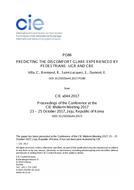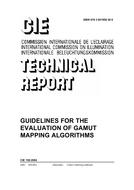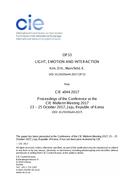Visual comfort, task performance, and observers satisfaction is affected by the dynamic nature of visual perception and cognition. The perceived quality of the visual environment can be investigated in terms of visual complexity, visual clarity, and visual preference. This paper investigates the relationship between visual preference, visual clarity, visual complexity, colourfulness and the effect of spatial characteristics of images on the perceived quality of indoor environments. A visual experiment is conducted to assess the accuracy of image quality metrics in estimating the visual complexity, visual clarity, visual preference, and colourfulness of 50 images of indoor environments. Seven image quality assessment measures were used to estimate observers subjective evaluations. Results indicate that image colourfulness metric M correlates statistically significantly with visual preference and perception of colourfulness. Visual complexity correlated with five of the metrics. Future research will investigate wide range on images, including human-made and outdoor scenes.
Product Details
- Published:
- 09/29/2021
- Number of Pages:
- 11
- File Size:
- 1 file , 1.3 MB
- Note:
- This product is unavailable in Belarus, Russia, Ukraine


